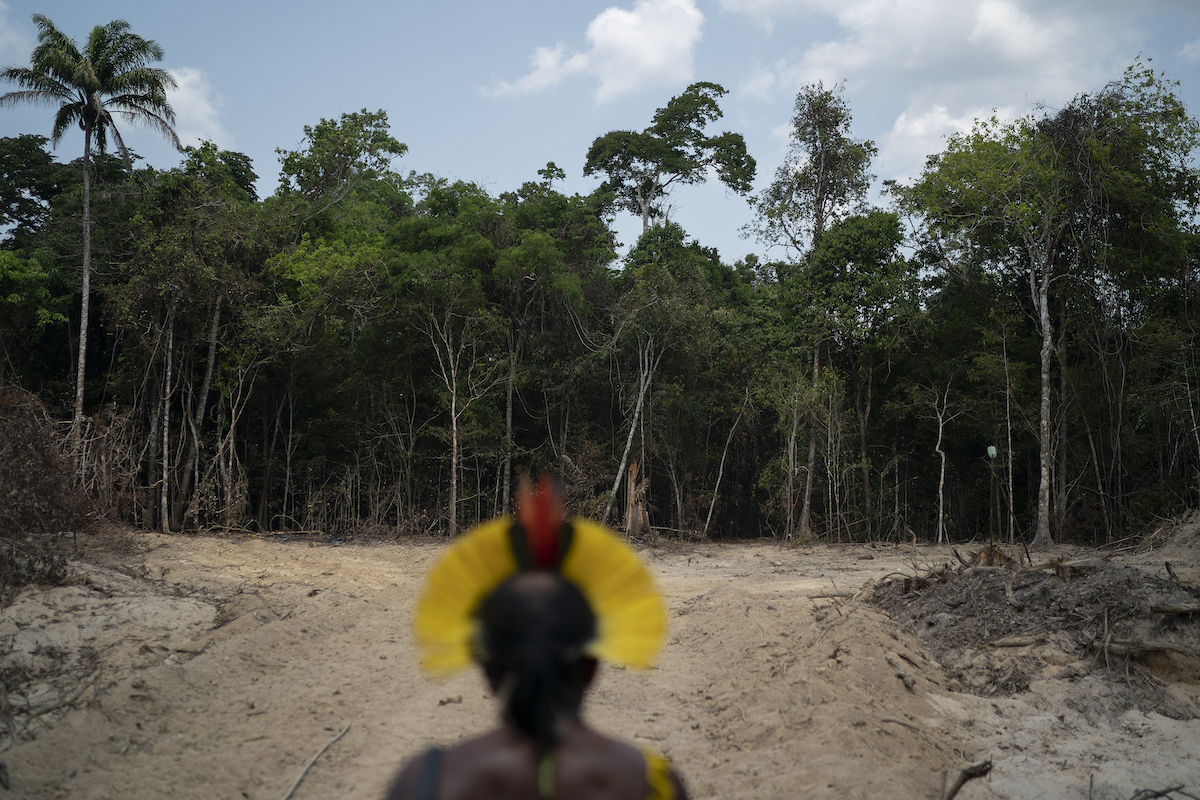

In this August 31, 2019 file photo, Krimej indigenous Chief Kadjyre Kayapo, of the Kayapo indigenous community, looks out at a path created by loggers on the border between the Biological Reserve Serra do Cachimbo, front, and Menkragnotire indigenous lands, in Altamira, Para state, Brazil. As the coronavirus spreads into indigenous lands, killing at least 40 people so far by the government’s count, the first two COVID-19 deaths were registered the last week of May 2020 in the Kayapo indigenous group, which has reported a total of 22 virus cases. (AP Photo/Leo Correa, File)
By YESICA FISCH and MAURICIO SAVARESE, Associated Press
RIO DE JANEIRO (AP) — As the coronavirus spreads into indigenous lands in Brazil, killing at least 40 people so far by the government’s count, the first two COVID-19 deaths were registered this week in the Xingu area, one of the biggest reserves in the world.
The two fatalities were in the Kayapo indigenous group, which has reported a total of 22 virus cases. The community’s leader, Megaron, told The Associated Press he wants President Jair Bolsonaro and other officials to stop loggers, miners and fishermen from illegally entering the territory, incursions he believes have sped up the spread of the virus.
Bolsonaro has encouraged development in the Amazon, regardless of indigenous lands, although the state-run indigenous agency, FUNAI, issued an order in mid-March barring access to those lands because of the virus. Still, reports in Brazilian media have said missionaries, health care agents, loggers and miners carried the virus into those areas.
“It is not us that are leaving and taking [the virus]. There are people seizing this disease to invade indigenous land,” Megaron said.
He received questions from AP on May 13, but his team wasn’t able to get his response back until Wednesday due to their remote location in Xingu, which covers more than 2,600,000 hectares (more than 10,000 square miles) in the middle of Brazil. It is home to more than 5,500 indigenous people of 14 ethnic groups.
Megaron, who is a nephew of acclaimed environmentalist Raoni Metuktire, said his community now lives in fear because of the coronavirus.
“It is the government’s obligation to take care of our land, our community, give us help, care, even more now because this disease is killing a lot of people. Our request is to be isolated in our village until the government or the health ministry say there is no more COVID-19,” he said.
A video obtained by AP contains footage dated Monday showing a dozen indigenous men blocking the entrance of a Kayapo village.
FUNAI has been slow in doing its job, members of its own staff in the Amazon told AP last week, speaking on condition of anonymity because of concerns about retribution. The agency replied that it has adopted “all the measures within its reach” for the pandemic, including the distribution of food and personal protection equipment.
While the government lists 40 coronavirus deaths of indigenous people inside the reserves, activists say about 150 in all have died in Brazil, including in cities. The toll is likely higher, because hospitals often don’t use patients’ indigenous names when admitting them.
Bolsonaro is a strong critic of environmentalist groups and nonprofit organizations that work with indigenous people. He also contends there has been an overreaction to the coronavirus and argues against lockdowns ordered by local officials, saying the economic disruptions from the crisis will kill more than the virus.
Environment Minister Ricardo Salles, a key ally of the country’s agribusiness lobby, contended at a Cabinet meeting on April 22 that Bolsonaro act while the focus is on the pandemic to push through deregulation of environmental policies.
Data from monitoring group Imazon showed deforestation in the Amazon hit a 10-year high in April, with almost 529 square kilometers (just over 200 square miles) of forest knocked down. Much of that harm, analysts say, comes from illegal loggers and miners.
***
Associated Press video journalist Yesica Fisch reported this story in Rio de Janeiro and AP writer Mauricio Savarese reported from São Paulo.


